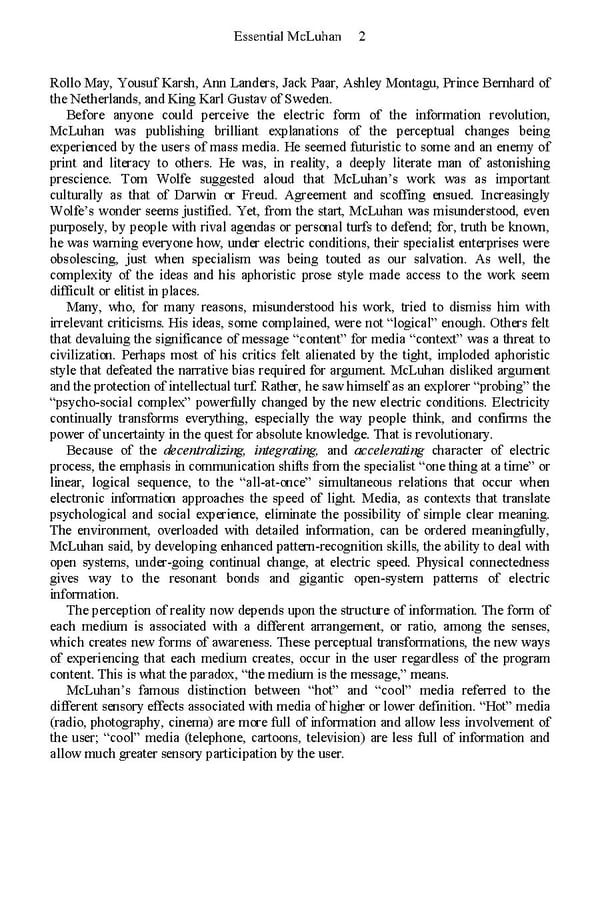Essential McLuhan 2 Rollo May, Yousuf Karsh, Ann Landers, Jack Paar, Ashley Montagu, Prince Bernhard of the Netherlands, and King Karl Gustav of Sweden. Before anyone could perceive the electric form of the information revolution, McLuhan was publishing brilliant explanations of the perceptual changes being experienced by the users of mass media. He seemed futuristic to some and an enemy of print and literacy to others. He was, in reality, a deeply literate man of astonishing prescience. Tom Wolfe suggested aloud that McLuhan’s work was as important culturally as that of Darwin or Freud. Agreement and scoffing ensued. Increasingly Wolfe’s wonder seems justified. Yet, from the start, McLuhan was misunderstood, even purposely, by people with rival agendas or personal turfs to defend; for, truth be known, he was warning everyone how, under electric conditions, their specialist enterprises were obsolescing, just when specialism was being touted as our salvation. As well, the complexity of the ideas and his aphoristic prose style made access to the work seem difficult or elitist in places. Many, who, for many reasons, misunderstood his work, tried to dismiss him with irrelevant criticisms. His ideas, some complained, were not “logical” enough. Others felt that devaluing the significance of message “content” for media “context” was a threat to civilization. Perhaps most of his critics felt alienated by the tight, imploded aphoristic style that defeated the narrative bias required for argument. McLuhan disliked argument and the protection of intellectual turf. Rather, he saw himself as an explorer “probing” the “psycho-social complex” powerfully changed by the new electric conditions. Electricity continually transforms everything, especially the way people think, and confirms the power of uncertainty in the quest for absolute knowledge. That is revolutionary. Because of the decentralizing, integrating, and accelerating character of electric process, the emphasis in communication shifts from the specialist “one thing at a time” or linear, logical sequence, to the “all-at-once” simultaneous relations that occur when electronic information approaches the speed of light. Media, as contexts that translate psychological and social experience, eliminate the possibility of simple clear meaning. The environment, overloaded with detailed information, can be ordered meaningfully, McLuhan said, by developing enhanced pattern-recognition skills, the ability to deal with open systems, under-going continual change, at electric speed. Physical connectedness gives way to the resonant bonds and gigantic open-system patterns of electric information. The perception of reality now depends upon the structure of information. The form of each medium is associated with a different arrangement, or ratio, among the senses, which creates new forms of awareness. These perceptual transformations, the new ways of experiencing that each medium creates, occur in the user regardless of the program content. This is what the paradox, “the medium is the message,” means. McLuhan’s famous distinction between “hot” and “cool” media referred to the different sensory effects associated with media of higher or lower definition. “Hot” media (radio, photography, cinema) are more full of information and allow less involvement of the user; “cool” media (telephone, cartoons, television) are less full of information and allow much greater sensory participation by the user.
 Essential McLuhan Page 8 Page 10
Essential McLuhan Page 8 Page 10